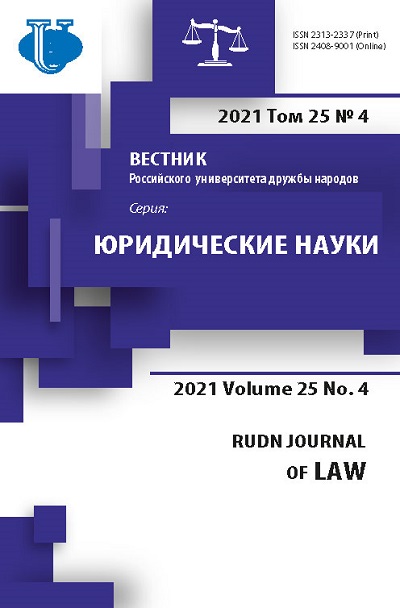Methodological function of the “genomic information” notion for human genome interdisciplinary researches
- Authors: Berg L.N.1
-
Affiliations:
- Ural State Law University
- Issue: Vol 25, No 4 (2021)
- Pages: 888-900
- Section: LAW AND GENOMIC RESEARCH
- URL: https://journals.rudn.ru/law/article/view/29516
- DOI: https://doi.org/10.22363/2313-2337-2021-25-4-888-900
Cite item
Full Text
Abstract
The author is convinced that a notion ‘genomic information’ is widespread in sciences thus justifies that a genomic information is already a general scientific notion. The author differentiates internal and external factors that have a great impact on the notion of ‘genomic information’. Internal factors are digitalization of sciences, interdisciplinary research, and a new type of rationality in science. External factors are modern economy that is based on scientific and technical progress. The article refers to the theory of notions’ ranges that was substantiated by A.M. Vasil’ev. It creates a new notions’ range concerning the notion of ‘genomic information’. It is crucial to understand that this notion is investigated in the aspect of legal information. In the author’s opinion, notions’ range concerning the ‘genomic information’ notion forms the basis for a fresh interdisciplinary law-and-genome theory which will be developing consequently. The author asserts that it is necessary to use general scientific approaches for law-and-genome information’s research. In this sense systematic and informational approaches are the most significant for interdisciplinary law-and-genome theory ones.
About the authors
Lyudmila N. Berg
Ural State Law University
Author for correspondence.
Email: mila-berg@mail.ru
ORCID iD: 0000-0001-8852-7971
Doctor of Legal Sciences, Associate Professor of the Department of Theory of State and Law
21, Komsomolskaya str., Ekaterinburg, 620137, Russian FederationReferences
- Ajunwa, I. (2014) Genetic testing meets Big data: Tort and Contract Law issues. Ohio, State Law Journal. 75 (6), 1233.
- Armand, A.D., Luri, D.I. & Zhernihin, V.V. et al. (1999) Anatomy of crises. Moscow, Nauka Publ. (in Russian).
- Berg, L.N. (2021) Theory of legal affecting. Moscow, Statut Publ. (in Russian).
- Bogdanova, E.E. (2019) Legal risks of genetic revolution: genetic information and discrimination. Lex russica. 6 (151), 18-29. (in Russian).
- Boltanova, E.S., Trychenkov, N.A. & Pshenichnikova, K.U. (2019) Genomic information as a type of information within a legal system of the Russian Federation. Issues of Constitutional, Municipal, Administrative and Financial Law. 4 (87), 20-25. (in Russian)
- Cheshko, V.F. & Glazko, V. I. (2009) High Hume (Bio-power and Bio-policy in Society of Risk). Moscow, Russian State Agrarian University - Moscow Timiryazev. Publ. (in Russian)
- Eckert, A. J., Bower, A. D. & Wegrzyn, J. L. et al. (2009) Association genetics of coastal Douglas-fir (Pseudotsuga menziesii var. menziesii, Pinaceae). I. Cold-hardiness related traits. Genetics. 182 (4), 1289-1302
- Fredrich, B., Schmöhl, M., Junge, O., Gundlach, S., Ellinghaus, D. & Pfeufer, A., et al. (2019) VarWatch - A stand-alone software tool for variant matching. PLoS ONE. 14 (4), e0215618. https://doi.org/10.1371/journal.pone.0215618
- Glazko, V.N. & Glazko, G.V. (2003) Introduction to genetic. Kiev, KVITs Publ. Рp. 224-226. (in Russian)
- Kimura, M. (1983) The Neutral Theory of Molecular Evolution. Cambridge: Cambridge University Press. https://doi.org/10.1017/CBO9780511623486
- Kondrat’ev, N.D. (1989) Big cycles of economic conditions: report. Issues of economic dynamic. Moscow, Ekonomika Publ. Рp. 172-226. (in Russian).
- Krutovskiy, K.V. (2006) From population genetics to population genomics of forest trees: integrated population genomics approach. Genetic. 42 (10), 1304-1318. (in Russian)
- Kudryavcev, U.V. (1981) Legal rule as social information. Moscow, Yuridicheskaya lititeratura Publ. (in Russian)
- Lysak, I.V. (2015) Information as a general scientific and philosophical concept basic approaches to its definition. Philosophical problems of information technology and cyberspace. 2 (10), 9-26. (in Russian)
- Meluhin, S.T. (1966) Substance in unity, infinity and development. Moscow, Mysl’ Publ. (in Russian).
- Miheev, V.S. (2016) Genomic Information. The Great Russian Encyclopedia. V. 6. Moscow. Available at: https://bigenc.ru/biology/text/2350490 [Accessed 15th February 2021]. (in Russian).
- Presman, A.S. (1997) Organization of the biosphere and its cosmic connection. Moscow, Geo-Sinteg Publ. (in Russian)
- Schumpeter, I.A. (1995) Capitalism, Socialism and Democracy. Translated from English. Autonomov V.S. (ed.). Moscow, Ekonomika Publ. (in Russain)
- Tihomirov, U.A. (2008) Cycles of legal development. Journal of Russian Law. (10), 15-22. (in Russian)
- Vasil’ev, A.M. (2021) Legal notions: methodological aspects of theory of law categories’ system developing. Moscow, Norma Publ., INFRA-M Publ. (in Russian)
- Villar-Hernánde, Bartolo de Jesús, Pérez-Elizalde, S., Crossa J., Pérez-Rodríguez, P., Toledo, F.H. & Burgueño, J. (2018) A bayesian decision theory approach for genomic selection. Genes, Genomes, Genetics. 8 (9), 3019-3037. https://doi.org/10.1534/g3.118.200430
- Zholkov, C.U. (2017) Notion ‘‘information’’ in philosophy and theory of information. Philosophy and culture. (10), 55-66. https://doi.org/10.7256/2454-0757.2017.10.24183 (in Russian)
















